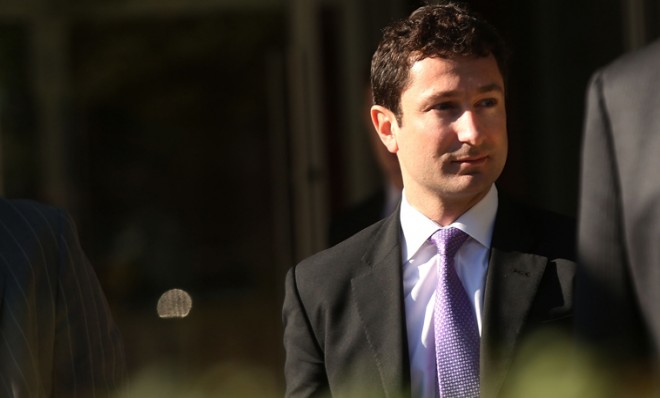Was the Fabrice Tourre verdict unfair?
Some say "Fabulous Fab" is a scapegoat

A free daily email with the biggest news stories of the day – and the best features from TheWeek.com
You are now subscribed
Your newsletter sign-up was successful
This week, a New York City jury found former Goldman Sachs trader Fabrice "Fabulous Fab" Tourre liable on six of seven charges stemming from a massive mortgage securities fraud case. It was the first win before a jury for the Securities and Exchange Commission in a long string of cases related to the financial crisis.
In 2007, Tourre was part of a team that built a synthetic CDO known as Abacus, which was an investment vehicle built from risky home loans that allowed clients to bet for or against its success. The agency accused Tourre of hiding from investors the fact that hedge fund Paulson & Co helped select mortgages for Abacus, then bet against the deal. When the mortgage market crumbled in 2008, those who bet on the underlying mortgages lost about $1 billion.
To some, Tourre's case has come to symbolize the bad behavior that ran rampant on Wall Street prior to the financial crisis. As evidence, the prosecution showed emails Tourre sent to his girlfriend that included one in which he colorfully described the fragile state of the financial system, as well as his personal role in it. "The whole building is about to collapse anytime now," Tourre wrote on Jan. 23, 2007. "Only potential survivor, the fabulous Fab... standing in the middle of all these complex, highly leveraged, exotic trades he created without necessarily understanding all of the implications of those moustruosities [sic]!!!"
The Week
Escape your echo chamber. Get the facts behind the news, plus analysis from multiple perspectives.

Sign up for The Week's Free Newsletters
From our morning news briefing to a weekly Good News Newsletter, get the best of The Week delivered directly to your inbox.
From our morning news briefing to a weekly Good News Newsletter, get the best of The Week delivered directly to your inbox.
The win is a feather in the cap of the SEC, which has had little luck nailing Wall Street for its role in the financial collapse. The verdict produced "happiness around the halls" at the agency, an insider told The Wall Street Journal.
But is it fair? Or is Tourre, a mid-level trader at an enormous bank, essentially a scapegoat? The Guardian's Heidi Moore:
Of course, it is inconceivable that Tourre acted alone, or even that he was a mastermind of the deal. He was just along for the ride. This prosecution is less about Abacus or Tourre, in fact, than it is about the SEC. Under siege for years from other regulators, including the savvy Preet Bharara in New York and numerous state attorneys general, the SEC needs to regain its dignity and prove it is the cop on the beat. [The Guardian]
The Washington Post's Ezra Klein agreed: "That’s a lot to lay at the feet of one lousy vice president at one investment bank, even if it is Goldman Sachs. Tourre is, in effect, the biggest of the small fry who have paid a personal legal price for the mega-crisis."
There were thousands of people on Wall Street and beyond who helped inflate a fraudulent mortgage bubble. What differentiates Tourre from the others is that he was both smart enough to understand what he was actually going on, and dumb enough to brag about it in an e-mail. That was enough to earn the SEC’s wrath. [The Washington Post]
The SEC will, however, have more opportunities to hold the finance industry responsible — just not the giants on Wall Street. Lawyers are already working on cases against 18 senior financial executives, says Marketplace.
A free daily email with the biggest news stories of the day – and the best features from TheWeek.com
The most prominent defendants are Daniel Mudd, former CEO of Fannie Mae, and Richard Syron, former chairman and CEO of Freddie Mac. The SEC sued them and four senior Fannie and Freddie executives in 2011 for allegedly misleading investors about how many risky subprime mortgages the then government-backed — now government-owned — agencies had guaranteed. Both former CEOs and the other defendants have denied any wrongdoing. They tried but failed to have the lawsuit dismissed. [Marketplace]
But if the agency wants to spread the blame beyond that, it will have start filing new lawsuits with the quickness. The statute of limitations on certain securities law violations is coming up in one month, says Marketplace.
Carmel Lobello is the business editor at TheWeek.com. Previously, she was an editor at DeathandTaxesMag.com.
-
 Switzerland could vote to cap its population
Switzerland could vote to cap its populationUnder the Radar Swiss People’s Party proposes referendum on radical anti-immigration measure to limit residents to 10 million
-
 Political cartoons for February 15
Political cartoons for February 15Cartoons Sunday's political cartoons include political ventriloquism, Europe in the middle, and more
-
 The broken water companies failing England and Wales
The broken water companies failing England and WalesExplainer With rising bills, deteriorating river health and a lack of investment, regulators face an uphill battle to stabilise the industry